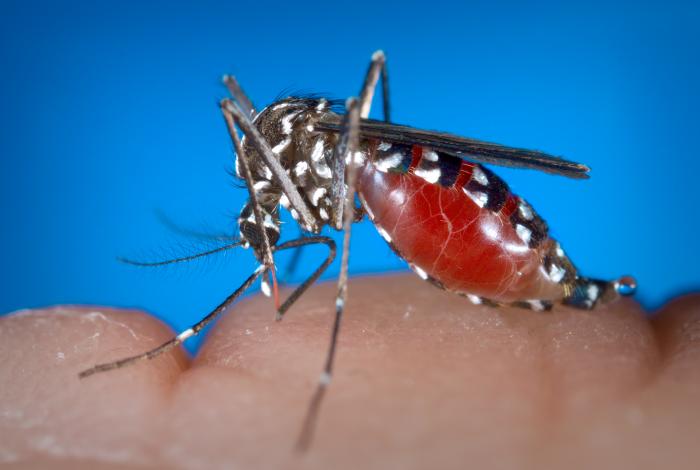Where do you begin to understand Zika?

It’s all the rage these days to get worked-up about Zika. Just like last year with Ebola, this year we’re freaking out over a disease from “over there” coming “over here” and hurting Americans. Also, the observed association between Zika infection in pregnancy and microcephaly is scaring the crap out of people. (It’s really scaring the far-right, anti-abortion people because women will start thinking of abortions as an alternative to having a microcephalic or anencephalic child.)
A letter went out to students and faculty at the school the other day asking for students to help do research to pin down the incubation period of Zika. The incubation period is the time from initial exposure/infection to the time of initial symptoms. It’s somewhat hard to pin down this time with Zika because it is transmitted primarily by mosquitoes. If you go to a place teeming with mosquitoes, it’s hard to figure out if yesterday’s exposure lead to infection, or the one from last week.
This problem is the same one we see with foodborne diseases. We eat a few times a day, so out opportunities for exposure are many, and they are continuous. But we figure out the likely culprit when different people start reporting the same exposure, e.g. eating the same food at the same event or from the same restaurant. So what do you do when the exposure is mosquito bites all the time, every day, all over the place?
For those, you look at people who travel into and then out of the areas with heavy mosquito presence and then got sick. You determine when the last day they were there was and count from there to get the soonest incubation time, then you determine when they arrived at the endemic area and get the latest incubation time. You this over and over again with as many travelers as possible, and then you figure it out.
As it turns out, Africa, Asian and South American researchers have done this. Even some European scientists who responded to a large outbreak in French Polynesia in the South Pacific have come out with a good estimate of the incubation period. They all agree that it’s between 5 days and two weeks, and that the disease lasts about one week (as long as two weeks). However, for some reason, the school is recruiting students to do a literature review to figure this out. (I cheated. I contacted tropical disease epidemiologists who’ve already done the work.)
And this is the thing about epidemiology education in the United States. As I mentioned before in “The Two Kinds of Epidemiologists“:
“The research and academic epidemiologist looks at a public health problem and designs a study to better understand it. He or she makes sure that the measurements are valid and that the information collected from the study is reliable. They take good care to choose the subjects carefully so as to not introduce bias into the study. With data in hand, they test several hypotheses about the mechanisms that cause whatever disease or condition that they’re studying. They use the “dark arts” — as one frequent reader/commenter has called biostatistics — to make sure that their observations are not due just by chance, or that they’re not being influenced by things seen or unseen. Finally, they put all of their findings in a research article and get it published at one of many reputable scientific journals.”
And then all that information sits in a journal, waiting to be used. Take, for example, the story of Brian Foy. From the Washington Post:
“Brian Foy, a researcher who studies mosquito-borne diseases, said in a 2011 paper that he had found likely evidence of a little-known virus spreading through sex. If true, it would be the world’s first documented case of sexual transmission of the virus, he said at the time.
Foy wanted to study it further, but no one would give him the funding he needed: He had found just one example, and the virus — known as Zika — was too obscure, he was told.”
I read that the other day, and my head exploded.

She gets me.
My head exploded because it was yet another example of how public health is failing to take all that knowledge into action. In 2010, two researchers published a really good paper on “Present and Future Arboviral Threats.” (Arboviruses are viruses transmitted by arthrobods. ARthropods + BOrne + VIRUS, get it?) They wrote:
“Perhaps the greatest health risk of arboviral emergence comes from extensive tropical urbanization and the colonization of this expanding habitat by the highly anthropophilic (attracted to humans) mosquito, Aedes aegypti. These factors led to the emergence of permanent endemic cycles of urban DENV and chikungunya virus (CHIKV), as well as seasonal interhuman transmission of yellow fever and Zika viruses.”
Had I been sitting at the White House and read that paper, I would have convened a panel from CDC, NIH, etc., to come up with an immediate plan to survey for these infections the world over and both track them and combat them… Years before they came to the United States.
But that’s the thing. There are plenty of us doing research and writing papers, and few of us working to put that knowledge into action. What is worse is that those of us who are working on it are not communicating well with each other. We either want to be protective of our work, or we just plain don’t know how to communicate our work. (Look at how we fail miserable to communicate the importance of vaccination in, say, Orange County, California. Effective communication would make anti-vaccine advocates be no more credible by the general public than people who believe the Earth is flat.)

We desperately need a Neil deGrasse Tyson of Public Health.
So the answer to the question I posed in the title is not “in the literature,” to be honest. The answer is “from each other… And now, before the next thing comes.”
“This is the time when things must be done before their time.” – 1949, Vol 5. No II of the Bulletin of the Atomic Scientists.
But, Ren, reading papers is haaaard!
LikeLiked by 1 person
That’s why I don’t read them. 😉
LikeLike
I’ve noticed two interesting views in the evidence free crowd. One, the “Rockerfeller patented Zika virus in 1947” (a Rockerfeller owned institution did patent the viral samples gathered from sentinel monkeys in Ethiopia in 1947) and there was a release of GMO mosquitoes in the endemic region in Africa where Zika is prominent.
Now, it’s “depopulation”, after all, killing off all of the workers and customers is great for any business model, right?
Their epic failure, as well as a pin headed theory on tetracycline usage in animal husbandry in the area and a lack of comprehension of what was actually released came up with tetracycline in the soil and runoff will repair heat shock proteins in the mosquitoes.
A problem: The mosquitoes are male, sterile and as mosquitoes do, eat sap and nectar and plants aren’t any good at uptake of tetracycline. It’s shame, if they were, all manner of blight could be trivially cured in cash crops.
As for Zika and fetal brain developmental failure, it’s a rare occurrence and the press is blasting it out as if it’s common. Add to it that the time window for the virus to wreak havoc in fetal brain development is rather narrow – during migration of neural proto-tissues and that some people actually defeat the virus with their innate immune system and never actually contract the disease, well…
It’s quite true that the two most common things in the universe are hydrogen and stupidity.
Oh, for the record, we covered Zika virus in our tropical disease vector and treatment training in the Army.
I suspect mosquito abatement is going to be a big thing in Rio this year, lest the crowds be frightened away from the 2016 Olympics.
Of course, Quarantine Christie’s at it again. Argh. The man has no clue about when and why to quarantine and what the fifth amendment says.
LikeLike
Yeah… It’s been around for a long time, and too many people have not been listening. The same thing was true for Ebola up until last year. And it will be true for the next thing after this thing… And the thing after that.
LikeLike
Yeah, I kind of blundered into that site on a search for something else Zika virus related, as I recalled the mosquito release from when it happened. I wondered what a certain Russian site was printing (RT), wow, but the agitators and crazies were out in force.
Heh, reminded me of the bad old days of the Cold War, all the disinformation and agitation. Russia had the first Ebola vaccine, as of Jan 10 or so, while we had tests that were successful reported in September, grand conspiracies and the only thing that they steered clear of was space aliens.
Only one replied to my reply with facts and common sense, with more BS. Fortunately for that individual, he deleted the reply before I got logged on in the morning. 😉
LikeLike